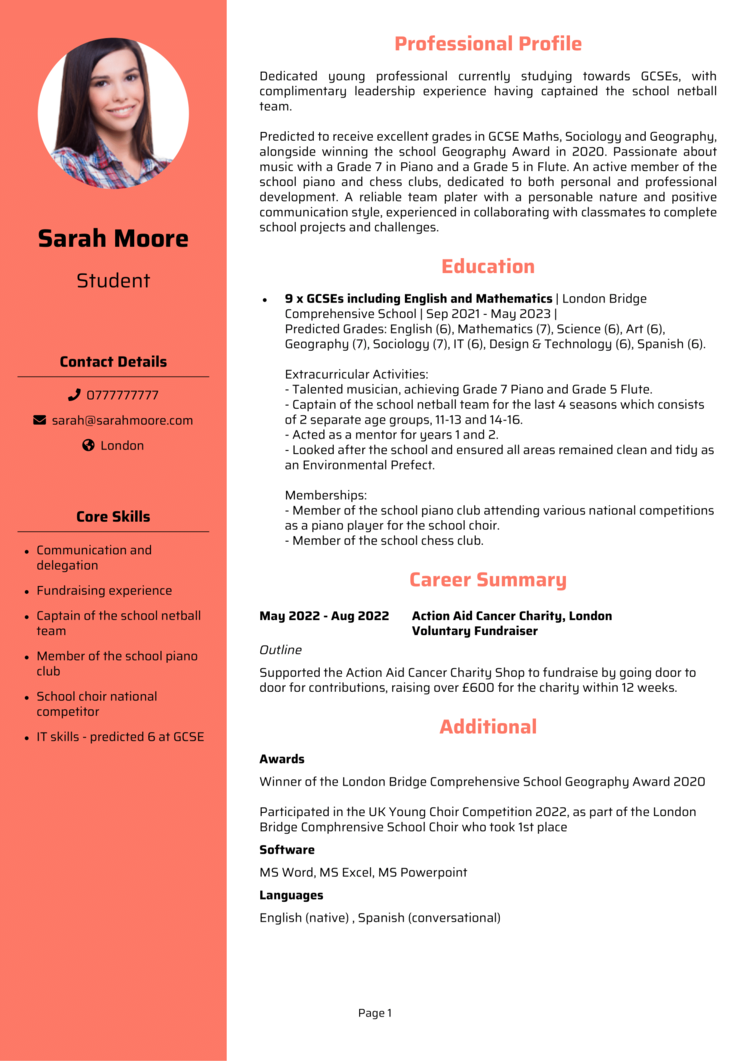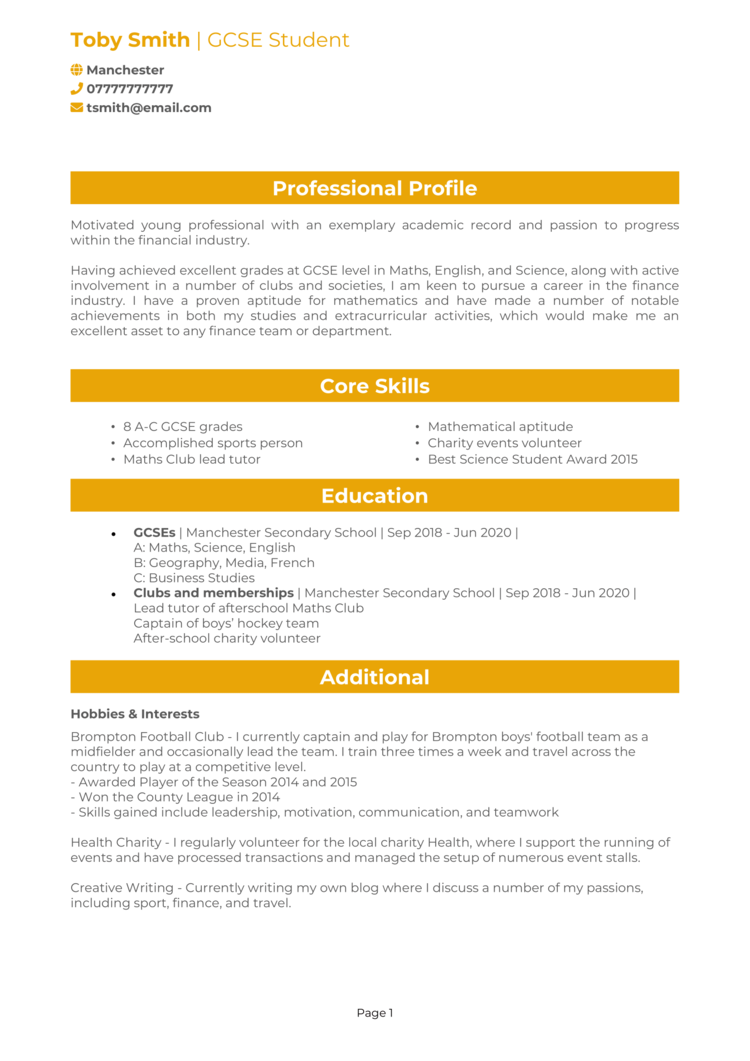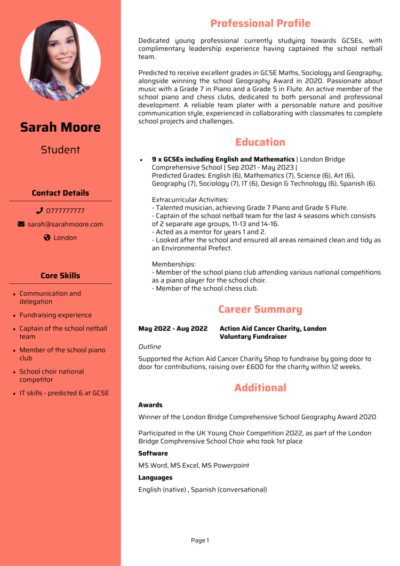Everyone has to start somewhere – even the most experienced professionals once had an empty CV. The key isn’t just listing past jobs (which you might not have yet) but proving you’ve got the skills, determination, and potential to succeed.
Employers don’t expect a long work history, but they do want to see motivation, transferable skills, and a well-structured application. This guide and its 2 no experience CV examples will help you highlight your strengths and potential – ensuring you get your foot in the door.
CV with no paid experience

CV with no experience

How to write your CV with no experience
Learn how to create your own interview-winning no-experience CV with this simple step-by-step guide.
A CV without experience doesn’t have to be a blank page – it’s just a different type of application. Instead of focusing on past jobs, you’ll showcase your education, skills, and any experience from volunteering, coursework, or extracurricular activities.
This guide will take you step by step through writing a CV, highlight your abilities, and present yourself as a strong candidate – even if your formal work history is still a work in progress.
How to structure a CV with no experience


A clear and organised CV makes it easy for recruiters to see what you bring to the table. Keep it structured. Even without work experience, your CV should look professional: if its layout is chaotic, employers might assume your work style is too.
Here’s the structure you should follow:
- Name and contact details – Keep your personal details at the top so a potential employer can reach out to you. Adding a photo is always entirely up to you.
- Personal statement – Immediately draw in the recruiter with a brief summary of your skills and education.
- Core skills – Quickly list your biggest strengths, like teamwork, communication, and problem-solving.
- Education – Whether you’re a graduate or a school leaver, list the academic background, coursework, and relevant projects that make you the right fit.
- Work experience – You’ve got more than you think: include volunteering, school projects, or personal initiatives that showcase transferable skills.
- Additional info – You can optionally list any relevant hobbies, languages, awards, and specialist skills which help to add value to your application.
CV format with no experience


Your CV should be as professional as any experienced applicant’s – presentation matters. Even without a packed work history, a quality format makes a strong first impression. Avoidable mistakes will only serve to distract from the skills you want to convey to recruiters.
Follow these formatting tips:
- Bullet points – Help the recruiter skim your CV quickly and pick up the important bits with ease.
- Divide sections – Logically organise the information and make it easy to navigate.
- Use a clear and readable font – Just make sure it’s a clear and easy font to read.
- No more than 1 page – Without any work experience, a single page should generally be enough length to cover everything without boring the reader.
CV profile with no experience


Think of this as your introduction in a job interview – just without the awkward handshake and nervous small talk. Your personal statement (typically called a profile for experienced candidates) is a short introduction that’ll go over the things that make you a good candidate, and emphasise the value you’ll bring to a company that hires you.
For anything you can’t easily mention in a CV, you should tailor a new cover letter for each job you apply to.
No experience CV profile examples
Profile 1
Motivated and enthusiastic individual seeking to gain practical experience in a professional setting. Completed work shadowing and volunteering opportunities, developing strong communication, teamwork, and organisational skills. Adaptable and eager to learn, with a proactive approach to problem-solving. Passionate about building a foundation for future career development.
Profile 2
Hardworking and reliable individual with experience gained through volunteering and informal roles. Skilled in assisting with events, customer service, and administrative support. Strong ability to work independently and as part of a team. Quick learner with a positive attitude, keen to develop workplace skills through hands-on experience.
What to include in your CV profile with no experience
You’ll need to include:
- Career aspirations – Explain what kind of role or industry you’re interested in.
- Key skills – Highlight abilities like organisation, adaptability, or teamwork.
- Education focus – If you’ve completed relevant studies or a degree, mention them here.
- Willingness to learn – Employers value candidates who are eager to grow.
- Personal strengths – Whether it’s problem-solving, creativity, or time management, highlight what makes you a strong hire.
Core skills section


Since you’re not relying on work experience, your CV skills section is especially important. This is where you highlight what makes you a great candidate with just a column or two of brief bullet points.
Think about what you’ve learned from education, extracurricular activities, or even personal projects. If you’ve worked on a group project, you’ve developed teamwork skills. If you’ve organised an event, that’s project management. You can use a free CV template the make structuring this bit easier.
Skills to include in a CV with no experience
- Willingness to Learn – Eager to acquire new skills and adapt to different tasks and responsibilities.
- Time Management – Organising tasks efficiently to meet deadlines and workplace expectations.
- Teamwork and Collaboration – Working effectively with colleagues to achieve common goals.
- Communication Skills – Expressing ideas clearly, following instructions, and engaging professionally with others.
- Problem-Solving – Thinking critically to find solutions and improve efficiency in daily tasks.
- Customer Service – Providing friendly and helpful assistance in customer-facing roles.
- Basic Computer Proficiency – Using Microsoft Office, Google Workspace, or industry-specific software.
- Organisation and Attention to Detail – Keeping workspaces tidy and completing tasks accurately.
- Adaptability and Flexibility – Quickly adjusting to new tasks, environments, and challenges.
- Workplace Etiquette – Demonstrating professionalism, punctuality, and respect in a professional setting.
Education section


When you don’t have work experience, education becomes your strongest selling point – so don’t just list it, make it count. This section will likely be the most detailed part of your CV. If you’ve recently finished school, college, or university, highlight your qualifications and relevant coursework.
If you’ve taken any additional courses, certifications, or training (such as online courses), include them here to show your commitment to learning.
Example education sections
Education 1
First Class BSc (Hons) Computer Science | University of Birmingham | 2021–2024
Modules included Artificial Intelligence, Software Development, and Cybersecurity. Completed a final-year project on machine learning applications in fraud detection, achieving a first-class grade.
D*D*D* BTEC Level 3 Extended Diploma in Information Technology | Sheffield College | 2019–2021
9x GCSEs (A*-C) | Sheffield High School | 2017–2019
Education 2
D*D*D BTEC Level 3 Extended Diploma in Business | Leeds City College | 2018–2020
Developed strong analytical, communication, and problem-solving skills through coursework in Business Strategy, Marketing Principles, and Financial Planning. Completed a project on entrepreneurship, which involved market research, budgeting, and presenting a business proposal. Gained hands-on experience in customer relations and operational management through practical assignments.
8x GCSEs (A-C) | Leeds Academy | 2016–2018
Achieved strong grades in English (A), Mathematics (A), and Business Studies (B), demonstrating numerical proficiency and communication skills. Developed teamwork and research abilities through coursework in Geography and Science. Gained confidence in public speaking and written communication through English Language and Literature projects.
What to include in your education section
For each qualification, add the following info:
- Qualification & organisation – Tell the recruiter what you studied and where.
- Dates studied – Give the dates of when you earned the qualification, or when you expect to finish.
- Extra details – Go into more depth on the most recent and relevant modules and projects you completed, if they’re relevant to the roles you’re applying for.
What qualifications do employers look for in candidates with no experience
- GCSEs/A-Levels (or equivalent qualifications) – Essential for demonstrating academic achievements.
- University Degree (if applicable) – A strong indicator of dedication and knowledge.
- Online Courses (Coursera, Udemy, etc.) – Showcases independent learning and initiative.
- First Aid or Health & Safety Certification – Useful for roles involving public interaction.
- Microsoft Office or IT Skills Certification – Valuable for many entry-level jobs.
Work experience


No job experience? No problem. Work experience doesn’t have to mean ‘officially employed’ – think volunteer work, projects, or even responsibilities at home.
Even if you haven’t had a job yet, you’ve likely gained skills through other activities: just because your name hasn’t been on a payroll yet doesn’t mean you don’t have valuable experience to showcase.
List these experiences in reverse chronological order, just like a work history.
Formatting your work experience for your CV

- Outline – Introduce the project, activity, or volunteer role and its purpose.
- Responsibilities – List key tasks, such as organising, researching, or collaborating with a team. Use action verbs like “led”, “organised”, and “assisted”.
- Achievements – Highlight any positive outcomes, such as successfully completing a project, receiving positive feedback, or learning a new skill.
Sample work experience for candidates with no experience
Work shadowing | D&H Law Firm
Outline
Gained first-hand insight into the legal profession by shadowing solicitors and observing casework.
Responsibilities
- Observed client consultations and court proceedings to understand legal procedures.
- Assisted with organising case files and preparing legal documentation under supervision.
- Engaged in discussions with solicitors about case strategy and legal research.
- Took notes during meetings and summarised key legal concepts for review.
- Learned about the importance of confidentiality and professional ethics in legal practice.
Achievements
- Developed a strong understanding of legal processes and client communication.
- Received positive feedback from legal professionals for proactive engagement.
- Enhanced research and analytical skills through exposure to real-world legal cases.
Volunteering assistant | Greenleaves Charity
Outline
Provided support for community projects and charity events, ensuring smooth operations and effective engagement with the public.
Responsibilities
- Helped set up and manage fundraising events, including arranging stalls and promotional materials.
- Assisted with social media campaigns to raise awareness for charity initiatives.
- Interacted with the public, answering queries and providing information about charity services.
- Sorted and organised donations, ensuring they were distributed efficiently.
- Supported administrative tasks, including data entry and updating contact lists.
Achievements
- Contributed to raising over £2,000 for local causes through event participation.
- Recognised by organisers for reliability and excellent communication skills.
- Improved teamwork and organisational abilities through event coordination.
Additional info


The additional info section is totally optional, and can be added to the bottom of your CV to include any extras like hobbies, languages, or awards.
You should had anything that might help recruiters see that you’re good fit for the role.
Good additional info for candidates with no experience
- Hobbies – Highlight activities that demonstrate skills such as teamwork, creativity, problem-solving, or dedication. Even casual interests can showcase useful qualities.
- Volunteering – Any unpaid work, such as helping at school events, community service, or assisting family businesses, shows responsibility and initiative.
- Awards and Achievements – Recognitions from school, competitions, or sports teams help demonstrate motivation and work ethic.
- Extracurricular Activities – Participation in clubs, student groups, or personal projects shows dedication, teamwork, and willingness to learn.
- Skills and Certifications – Any online courses, self-taught skills, or certifications (like First Aid or IT skills) can help strengthen your application.
Additional info example
Additional info
Hobbies
Photography – Capturing and editing images for personal projects, improving creativity and attention to detail.
Cooking – Experimenting with new recipes and managing time effectively in the kitchen.
Volunteering
School event helper – Assisted with setting up and running events, improving teamwork and communication skills.
Community clean-up – Took part in local environmental initiatives, demonstrating responsibility and commitment.
Extracurricular Activities
Student mentor – Helped younger students with schoolwork, improving communication and leadership abilities.
Skills and Certifications
First Aid (Red Cross) – Completed basic first aid training, learning how to respond to emergencies.





